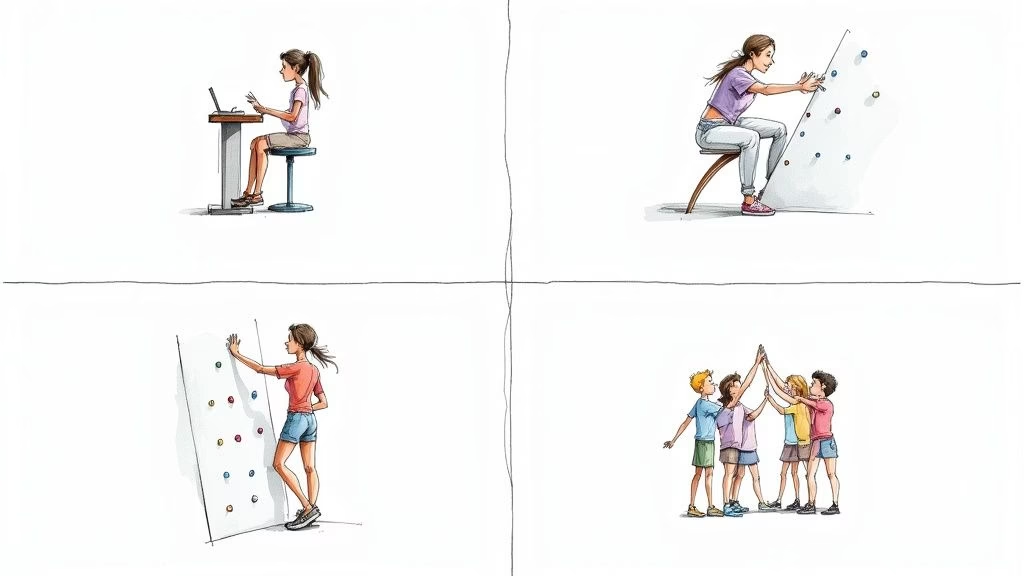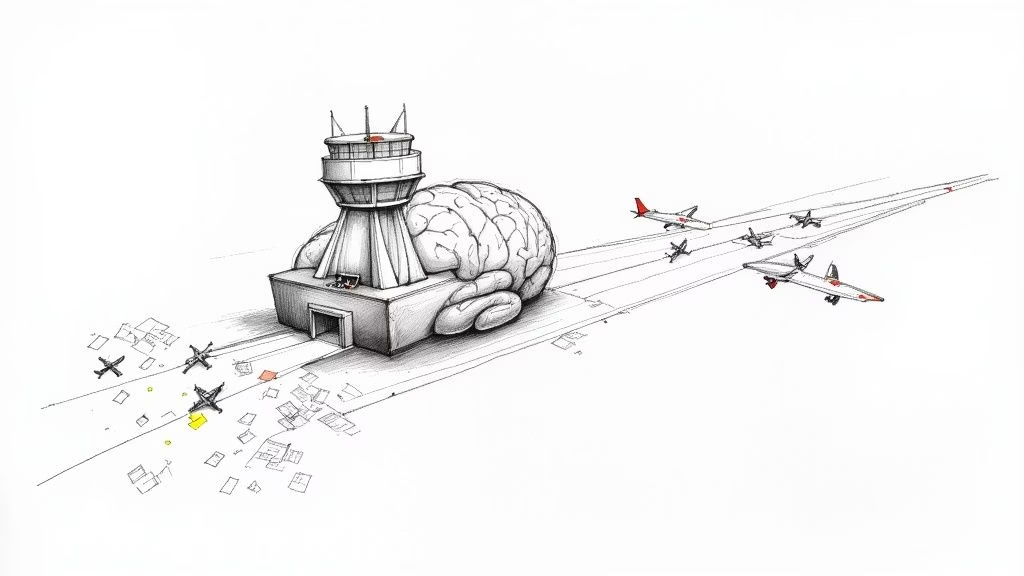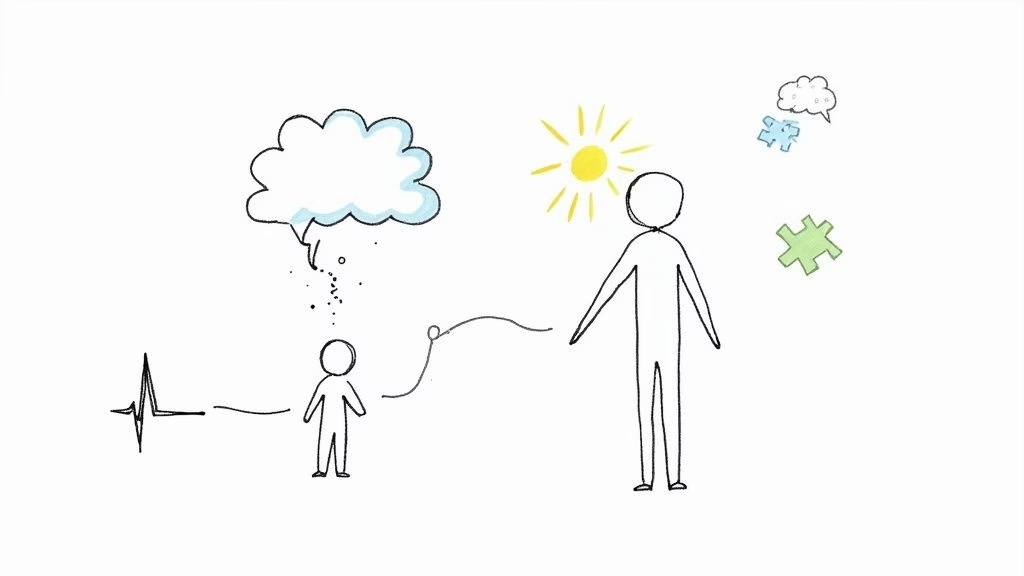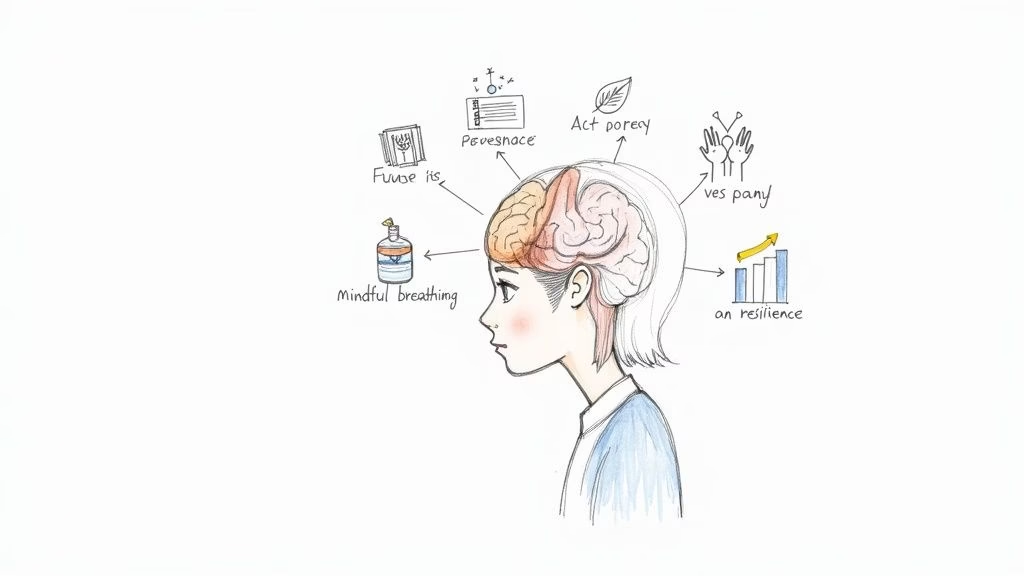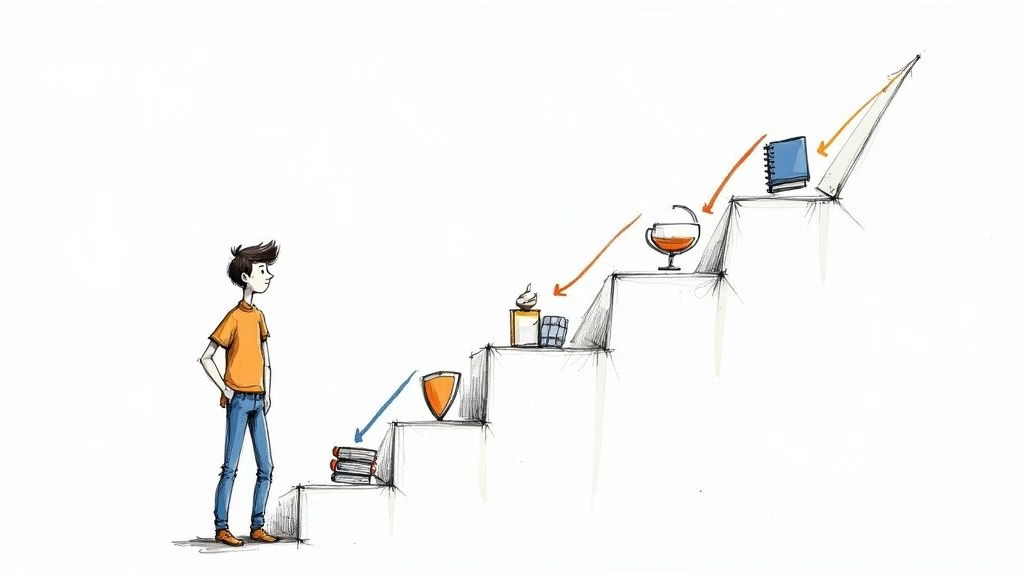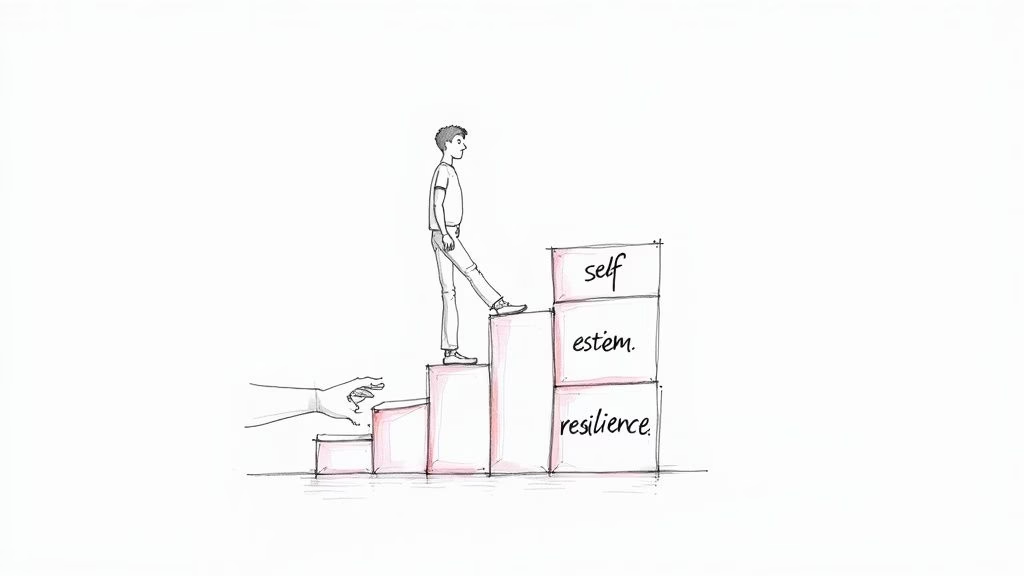Navigating the teenage years can feel like walking a tightrope. One moment, your teen is on top of the world; the next, they're grappling with self-doubt. This fluctuation is normal, but as a parent, you have a powerful role to play in building a stable foundation of self-worth. Procrastination, school-related stress, and a lack of motivation are often symptoms of deeper confidence issues. This article moves beyond generic advice to provide a comprehensive roundup of structured, effective confidence building activities for teenagers.
We will explore practical, actionable strategies designed to foster genuine self-esteem. From the introspective power of solo sports like hiking and climbing to the collaborative energy of team pursuits, each activity offers a unique pathway to resilience. This guide is built to help your teen discover their inherent strengths, develop coping mechanisms for academic and social pressures, and build a positive self-identity that will serve them for life.
Inside, you will find a detailed breakdown of specific activities, complete with parenting tips, implementation details, and resources for mental health and motivation. Each item on our list serves as a stepping stone toward a more self-assured and empowered young adult, one who is ready to face the world with conviction and purpose.
1. Public Speaking and Presentation Workshops
Public speaking is often cited as a top fear, but mastering it is one of the most powerful confidence building activities for teenagers. Structured workshops provide a safe, supportive environment for teens to develop skills in voice projection, body language, and content organization. This process helps them conquer performance anxiety and articulate their thoughts clearly and persuasively, a skill that directly combats procrastination by fostering better planning and execution.
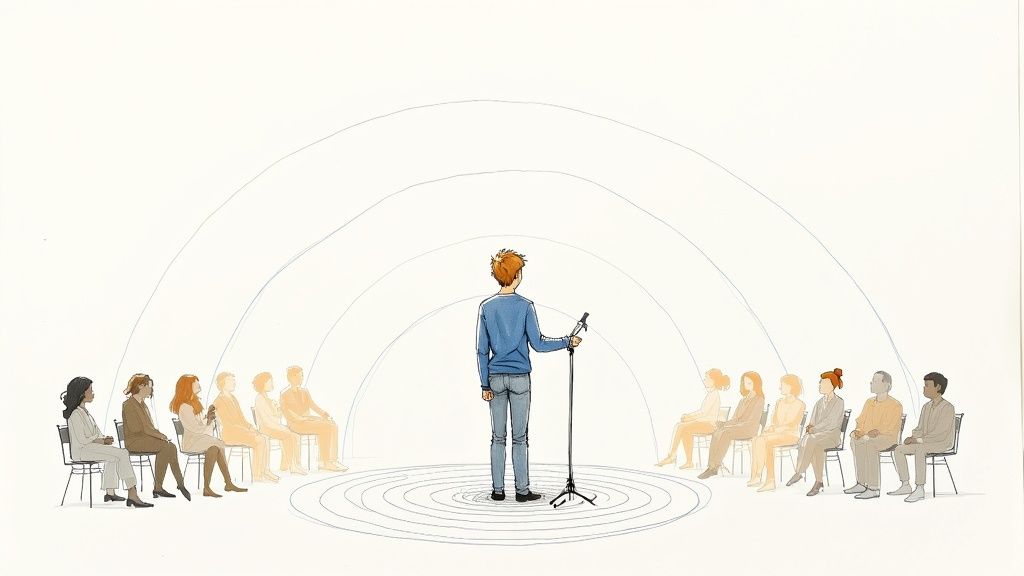
These programs build resilience by turning a source of fear into a point of strength. The structured, incremental approach allows teens, including young men who may feel pressure to appear stoic, to build competence step-by-step. Starting with small group talks and progressing to larger audiences makes the challenge manageable and rewarding.
Why It Works
The act of standing before an audience and successfully sharing an idea provides an immediate and tangible self-esteem boost. This experience teaches teens that they can manage stress, organize complex thoughts, and influence others. This newfound competence often translates into improved academic performance and a more proactive approach to schoolwork.
Practical Tips for Parents and Teens
- Start with Passion: Encourage your teen to first present on a topic they genuinely love, like a favorite video game or artist. This passion minimizes anxiety and makes the experience more enjoyable.
- Create a Safe Space: Emphasize that mistakes are learning opportunities. A "failure-friendly" environment at home and in workshops is crucial for building the courage to try.
- Practice with Purpose: Use the "Rule of Three" by rehearsing each presentation at least three times. Recording these sessions allows for constructive self-evaluation without external pressure.
- Utilize Power Poses: Before speaking, encourage your teen to stand in a "power pose" (e.g., hands on hips, chest out) for two minutes. Research from social psychologist Amy Cuddy suggests this can increase feelings of confidence.
Where to Start
Numerous organizations offer excellent programs that build these essential skills.
- Toastmasters Youth Leadership Program: A world-renowned program that provides a structured, supportive club environment for teens to practice speaking.
- High School Debate or Model UN Clubs: These build critical thinking and diplomatic communication skills alongside public speaking.
- TED-Ed Student Talks: This platform guides students to develop and share their own TED-style talks, fostering creativity and public presence.
2. Goal-Setting and Achievement Journaling
This structured practice is one of the most effective confidence building activities for teenagers, empowering them to take control of their ambitions. It involves identifying personal goals, breaking them into manageable steps, tracking progress, and reflecting on achievements. This process transforms abstract dreams into a concrete action plan, building self-efficacy with every small win and directly combating procrastination by providing a clear daily focus.
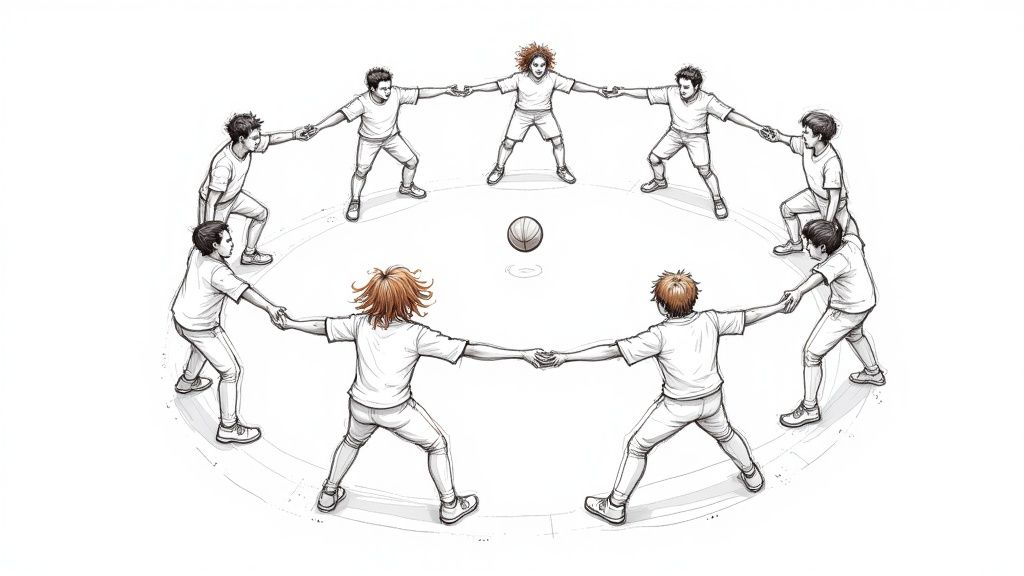
The act of journaling creates a powerful feedback loop. As teens, including young men who often internalize struggles, document their efforts and see progress, they develop a growth mindset. This internal validation is crucial; it teaches them that their actions directly lead to results, which builds resilience and motivation for school and life. As James Clear popularized with Atomic Habits, the focus shifts from the daunting final goal to the small, achievable daily systems that guarantee progress.
Why It Works
Achievement journaling provides tangible proof of competence. Looking back at a record of completed tasks, overcome obstacles, and celebrated milestones provides an undeniable boost to self-esteem. It helps teens connect effort with outcomes, reducing feelings of helplessness and anxiety. This clarity often leads to improved academic performance and a more organized approach to overwhelming projects, such as college applications.
Practical Tips for Parents and Teens
- Start with Micro-Goals: Begin with a goal that can be accomplished in a week, like organizing a desk or finishing a book. Quick wins build momentum.
- Use the "3-3-3 Method": Frame your ambitions by setting 3 yearly goals, breaking them into 3 monthly goals, and defining 3 daily actions to support them.
- Reframe Failure as Data: Encourage your teen to write about setbacks not as defeats, but as "data collection" for what to try differently next time. This removes the sting of failure.
- Review Weekly Wins: Set aside 15 minutes every Sunday to review the week's journal entries and celebrate every victory, no matter how small. This reinforces positive behavior.
Where to Start
Several methods and tools make it easy to begin this transformative habit. For a deeper dive into structuring these ambitions, you can learn more about goal setting for teenagers here.
- The Bullet Journal Method: Ryder Carroll's system is highly flexible and allows for creative customization, which is perfect for teens who want a less rigid structure.
- High Performance Planner: Inspired by Brendon Burchard, this planner provides a structured format with daily prompts for goal-setting, gratitude, and reflection.
- Digital Apps: Tools like Trello, Notion, or Habitica can gamify the process of tracking goals and habits, making it more engaging for tech-savvy teens.
3. Team Sports and Collaborative Physical Activities
Engaging in team sports is one of the most effective confidence building activities for teenagers, offering a dynamic environment to develop both physical and social skills. These organized activities provide a structured setting where teens work toward a common goal, learn from setbacks in a supportive context, and build a strong sense of belonging. The mix of individual skill development and collaborative success creates multiple pathways to enhanced self-esteem.

The benefits extend far beyond the playing field. Mastering a new skill, contributing to a team play, and handling both wins and losses builds resilience and character. For young men especially, a positive team environment offers a healthy outlet for competitive energy and a space to build strong, supportive peer relationships. Moreover, the discipline required for practice and games can directly combat procrastination by instilling better time management habits.
Why It Works
Team sports provide immediate, tangible feedback and a clear sense of purpose. Scoring a point, mastering a drill, or supporting a teammate offers a direct boost to a teen's sense of competence. This environment teaches valuable lessons in communication, problem-solving, and managing emotions under pressure. These experiences build a robust sense of self that translates to greater confidence in academic and social situations, making it easier for teens to navigate complex group projects and social dynamics.
Practical Tips for Parents and Teens
- Prioritize Participation over Winning: Seek out leagues and coaches, like those affiliated with the Positive Coaching Alliance, that focus on character development and personal improvement.
- Explore Beyond the Mainstream: Consider non-traditional activities like ultimate frisbee, rock climbing groups, or dragon boat racing, which often have highly inclusive and supportive communities.
- Embrace Solo Pursuits: While team dynamics are powerful, the confidence gained from solo activities like hiking or climbing is immense. The art of successfully navigating a challenge alone builds profound self-reliance.
- Focus on Effort and Teamwork: Center post-game conversations on your teen's effort, sportsmanship, and contributions to the team rather than just the final score.
- Encourage Individual Fitness: Beyond structured sports, encouraging individual fitness pursuits can also boost self-esteem. Resources offering a comprehensive guide to starting a workout routine can provide a great foundation.
Where to Start
Many organizations use sports to foster youth development and build crucial life skills.
- School Athletics and Community Leagues: These are accessible starting points that offer a variety of sports for different skill and commitment levels.
- Girls on the Run: This program masterfully combines running with a curriculum designed to boost confidence and emotional intelligence in young girls.
- Up2Us Sports: This organization trains coaches to be mentors who use sports as a tool for positive youth development in underserved communities.
4. Theater and Improv Comedy Classes
Theater and improv classes are dynamic and engaging confidence building activities for teenagers, offering a playful yet powerful path to self-assurance. These programs use acting exercises, improvisation games, and stage work to create a safe space where teens can experiment with different personas, make mistakes publicly, and develop quick-thinking skills. The core principle of improv, "yes, and…," teaches teens to build on ideas collaboratively, which helps them become more adaptable and less afraid of uncertainty.
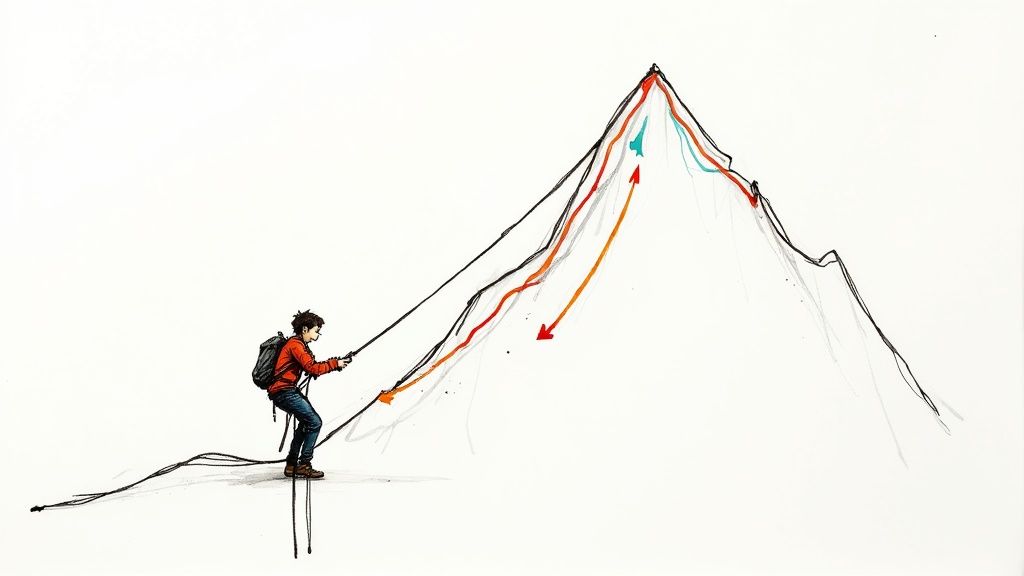
This creative outlet provides a unique way for teens, including young men who may feel pressured to suppress emotions, to explore and express a wide range of feelings. By stepping into different roles, they build empathy and emotional intelligence. The structured, supportive environment of a drama class allows them to take social risks without fear of real-world judgment, building resilience and social courage.
Why It Works
Improv and theater demand presence, listening, and teamwork, skills that directly translate to better communication in school and life. The experience of performing, even in a small class setting, provides a tangible boost to self-esteem. It teaches teens to trust their instincts and quiet their inner critic, which can be a powerful tool against procrastination and academic anxiety, as they learn to act without overthinking.
Practical Tips for Parents and Teens
- Start with Improv Games: Begin with low-pressure improv games like "Zip Zap Zop" rather than scripted scenes to build energy and reduce performance anxiety.
- Emphasize "No Wrong Answers": Consistently reinforce the philosophy that in improv, every contribution is valid. This encourages creative risk-taking.
- Focus on the Ensemble: Initially, participate in group and ensemble activities before moving to individual spotlights. This builds a sense of team and shared responsibility.
- Celebrate Bold Choices: Praise effort and courageous choices over a "perfect" performance. The goal is to encourage trying new things without fear of failure.
Where to Start
Many local and national programs offer excellent classes designed for teens.
- Second City and The Groundlings: These famous comedy theaters offer teen and youth programs that teach foundational improv skills in a fun environment.
- High School Drama Club: An accessible and school-integrated way to explore acting and build connections with peers.
- Community Theater: Local theaters often have youth programs that provide performance opportunities and skill-building workshops for all levels.
5. Mentorship and Youth Leadership Programs
Engaging in structured programs that pair teenagers with adult mentors or place them in leadership roles is one of the most effective confidence building activities for teenagers. These experiences build self-worth through meaningful relationships, skill transfer, and the responsibility of being a role model. Whether learning from an accomplished adult or guiding younger peers, teens develop a stronger sense of competence, purpose, and identity.
These programs offer a unique space for growth, especially for young men who may feel pressured to figure things out on their own. Having a dedicated mentor provides a safe outlet to discuss challenges and aspirations. Similarly, taking on a leadership role positions teens as capable decision-makers, directly challenging feelings of inadequacy and procrastination by requiring them to act with purpose.
Why It Works
The act of either receiving dedicated guidance or successfully leading others provides powerful, evidence-based boosts to self-esteem. For a mentee, having an adult invest in their success affirms their value and potential. For a teen leader, the responsibility of guiding others solidifies their own knowledge and builds a profound sense of capability. This newfound confidence often translates into better academic engagement and a clearer vision for the future.
Practical Tips for Parents and Teens
- Match Interests and Personality: Ensure a good fit between a mentor and teen based on shared hobbies, career goals, or personalities to foster a genuine connection.
- Set Clear Expectations: Begin any program by establishing clear goals, communication expectations, and meeting schedules to build a reliable and respectful relationship.
- Encourage Vulnerability: Mentors should be encouraged to share their own stories of struggle and growth, showing the teen that challenges are a normal part of success.
- Provide Leadership Training: For peer mentoring or leadership roles, provide teens with training in communication, conflict resolution, and empathy to set them up for success. Learn more about effective leadership for teens here.
Where to Start
Many established organizations offer high-quality mentorship and leadership opportunities.
- Big Brothers Big Sisters: A renowned one-on-one mentoring program with proven positive outcomes for youth confidence and decision-making.
- Boys & Girls Clubs of America: Offers various leadership programs, like Keystone Clubs, that empower teens to engage in community service and leadership projects.
- MENTOR (The National Mentoring Partnership): A great resource for finding vetted local and national mentoring programs tailored to specific needs.
6. Adventure and Outdoor Challenge Programs
Placing a teen in an environment where they must overcome tangible obstacles is one of the most effective confidence building activities for teenagers. Adventure and outdoor programs use experiential learning, through activities like rock climbing, backpacking, and ropes courses, to teach resilience and self-reliance. This process of facing a physical challenge, like reaching the top of a climbing wall or navigating a trail, provides a powerful metaphor for overcoming personal and academic hurdles.
These programs build confidence through the direct experience of mastering fears and achieving goals. The feeling of accomplishment is not abstract; it’s a visceral, earned success that rewires a teen’s self-perception. For young men and women alike, mastering a solo sport like climbing or completing a solo hike fosters a profound sense of independence and capability that is hard to replicate elsewhere.
Why It Works
Successfully navigating an outdoor challenge provides immediate, undeniable proof of a teen’s strength and competence. This builds a deep-seated belief that they can handle difficult situations, which directly translates to reduced anxiety when facing school projects or social pressures. The focus and problem-solving required to complete a hike or a climb also help teens break patterns of procrastination by teaching them to tackle large goals one step at a time.
Practical Tips for Parents and Teens
- Start Local and Solo: Encourage solo activities first. A teen learning to navigate a local trail or mastering a route at a climbing gym on their own builds foundational self-reliance.
- Embrace 'Challenge by Choice': Look for programs that allow teens to choose their level of participation. This philosophy prevents overwhelm and ensures the experience is empowering, not intimidating.
- Prepare and Debrief: Help your teen prepare physically and mentally for any challenge. Afterward, discuss the experience: What was hard? What did you learn about yourself? This connects the outdoor accomplishment to everyday life.
- Journal the Journey: Encourage your teen to document their adventures with photos or a journal. Reviewing these moments of triumph can serve as a powerful confidence booster during stressful times.
Where to Start
These organizations are pioneers in using outdoor challenges for personal development.
- Outward Bound: Offers a wide range of challenging expeditions designed to build character, leadership, and an ethic of service.
- NOLS (National Outdoor Leadership School): Focuses on teaching technical outdoor skills, leadership, and environmental ethics on extended wilderness courses.
- Local Climbing Gyms: Provide a highly accessible, ongoing way for teens to challenge themselves, build physical strength, and join a supportive community.
7. Creative Arts and Maker Projects
Engaging in hands-on creative activities is a uniquely effective method for building self-worth, as it transforms abstract ideas into tangible achievements. Maker projects, which include everything from visual arts and coding to robotics and woodworking, offer teens a powerful outlet for self-expression and skill development. These activities are some of the most accessible confidence building activities for teenagers because they emphasize process, mastery, and personal satisfaction over direct competition.
The act of creating something from scratch provides a clear, visible testament to one's abilities and dedication. Whether a teen builds a functional app, paints a canvas, or assembles a robot, the finished product serves as a concrete reminder of their competence. This process directly combats feelings of inadequacy and provides a constructive way to manage stress, turning idle time into productive, self-affirming work.
Why It Works
Maker projects cultivate confidence by focusing on incremental progress and problem-solving. Completing a project, no matter how small, triggers a sense of accomplishment and proves that persistence leads to results. This mindset is invaluable for academic settings, where it helps teens break down large assignments and overcome procrastination. For young men and teens who may struggle with verbal expression, creating something tangible offers a powerful, alternative way to communicate their identity and abilities.
Practical Tips for Parents and Teens
- Start with Quick Wins: Begin with projects that can be finished in a single session, like a simple coding script or a small craft, to provide an immediate confidence boost.
- Emphasize Process, Not Perfection: Celebrate the effort, learning, and problem-solving involved. Frame mistakes as essential steps in the creative journey rather than failures.
- Create a Dedicated Space: Designate a corner, desk, or room for creative work that is free from judgment and interruption. This physical space helps foster a creative mindset.
- Show Your Work: Inspired by Austin Kleon's philosophy, encourage your teen to share their progress with a supportive audience, whether it's family, friends, or a positive online community. This reinforces their achievement and builds a sense of connection.
Where to Start
Countless resources exist to help teens dive into the world of making and creating.
- Local Makerspaces or FabLabs: These community workshops provide access to tools like 3D printers and laser cutters, often with introductory classes for teens.
- FIRST Robotics: This global robotics community offers programs where students design, build, and program robots, showing dramatic confidence gains, especially for girls in STEM.
- Instructables: A website offering free step-by-step guides for thousands of DIY projects, from electronics to crafts, perfect for self-directed learning.
8. Volunteer Work and Community Service Projects
Contributing to a cause greater than oneself is one of the most effective confidence building activities for teenagers. Organized volunteer work allows teens to apply their skills in real-world settings, see the tangible impact of their efforts, and understand their capacity to create positive change. This shift in focus from internal anxieties to external needs builds a profound sense of purpose and capability.
Engaging in service develops empathy, responsibility, and a strong work ethic. For teens, including young men who may feel pressure to find their place, seeing their work directly help struggling families at a food bank or improve a local park provides undeniable proof of their value. This external validation reinforces internal self-worth and competence.
Why It Works
Volunteering paradoxically builds self-confidence by focusing on the needs of others. It provides a structured environment to develop new skills, from construction with Habitat for Humanity to communication at an animal shelter, without the pressure of academic grades. This experience demonstrates that they are capable, needed, and can make a meaningful difference, directly boosting self-esteem.
Practical Tips for Parents and Teens
- Align with Passion: Find a cause that genuinely interests your teen, whether it's environmental cleanup, animal welfare, or peer tutoring. Authentic engagement makes the experience more rewarding.
- Start Small: Begin with a one-day event or a short-term project to avoid overwhelming them. Success in a limited role builds the confidence to take on a larger commitment.
- Volunteer Together: Make it a family activity or encourage them to sign up with friends. The social connection can reduce anxiety and make the service more enjoyable.
- Reflect on the Impact: Talk about the experience afterward. Discuss what they learned, how they felt, and the difference they made. This reflection helps internalize the confidence boost.
Where to Start
These organizations connect teens with meaningful service opportunities.
- VolunteerMatch: A massive online database that allows you to search for local and virtual volunteer opportunities based on interest and location.
- DoSomething.org: Empowers young people to participate in campaigns for social change, offering easy-to-join, high-impact projects.
- Key Club International: A student-led organization that provides its members with opportunities to provide service, build character, and develop leadership.
Confidence Building Activities Comparison Table
| Activity | Implementation Complexity | Resource Requirements | Expected Outcomes | Ideal Use Cases | Key Advantages |
|---|---|---|---|---|---|
| Public Speaking and Presentation Workshops | Moderate (requires facilitator) | Professional facilitator, space, possible fees | Improved communication, anxiety management, confidence | Teens seeking communication skills and leadership | Builds transferable skills; measurable progress; supportive environment |
| Goal-Setting and Achievement Journaling | Low | Journal/notebook, writing tools | Enhanced self-awareness, planning, persistence | Independent or guided personal growth | Low cost; builds discipline and growth mindset |
| Team Sports and Collaborative Physical Activities | High | Equipment, facilities, coaching | Teamwork, resilience, physical fitness | Physically active teens, social skill building | Builds community; improves health; multiple contribution paths |
| Theater and Improv Comedy Classes | Moderate | Instructor, space, possible fees | Creativity, adaptability, reduced social anxiety | Teens comfortable with creative expression | Enhances spontaneity; empathy; supportive community |
| Mentorship and Youth Leadership Programs | High | Mentors, program structure, time | Leadership, responsibility, relationship skills | Teens seeking guidance and leadership roles | Builds purposeful relationships; leadership skills; accountability |
| Adventure and Outdoor Challenge Programs | High | Specialized facilitators, gear, location | Courage, self-reliance, resilience | Teens interested in physical and mental challenge | Immediate capability evidence; peer bonding; breaks digital cycle |
| Creative Arts and Maker Projects | Moderate | Materials, tools, space | Creativity, technical skills, self-expression | Teens with artistic or technical interests | Tangible achievements; process-focused; low social pressure |
| Volunteer Work and Community Service Projects | Moderate | Access to sites, supervision | Empathy, responsibility, sense of purpose | Teens wanting to contribute and gain skills | Demonstrates impact; builds empathy; resume-building opportunities |
Building Lasting Confidence: Tools and Next Steps for Your Teen's Journey
The journey to building authentic, lasting confidence is not about a single achievement or one-time event; it's a continuous process of self-discovery, resilience, and personal growth. The diverse range of confidence building activities for teenagers we've explored, from public speaking workshops and team sports to creative maker projects and community service, provides a rich toolkit for this journey. Each activity offers a unique pathway for your teen to develop competence, learn from setbacks, and cultivate a robust sense of self. The goal is not to find one perfect solution but to create a supportive environment where they feel safe to explore, fail, and try again.
Key Takeaways for Fostering Self-Belief
True confidence is built on a foundation of experience, not just praise. It comes from the quiet satisfaction of achieving a goal set in a journal, the collaborative spirit of a team victory, the vulnerability of an improv performance, and the quiet competence learned during a solo hike. These experiences teach teens that they are capable, adaptable, and can rely on themselves when faced with challenges. A crucial element, especially for young men who may struggle with expressing vulnerability, is learning the art of self-reliance. Solo pursuits like climbing or hiking provide an unparalleled opportunity to problem-solve independently and build a deep trust in their own judgment.
Actionable Next Steps for Parents and Teens
Supporting this development goes beyond simply suggesting activities. It involves actively fostering their mental and emotional well-being, which is the bedrock of confidence. If academic pressure, procrastination, or anxiety are holding your teen back, introducing mindfulness can be a powerful first step. A simple 5-minute meditation can make a significant difference: find a quiet space, focus on the breath by inhaling for four counts, holding for four, and exhaling for six, and gently guide the mind back when it wanders.
For those seeking more structured support, especially for teen boys, organizations like The ManKind Project offer mentoring programs that provide a positive community. Additionally, reliable resources such as the National Institute of Mental Health (NIMH) offer research-backed information to help you understand and support your teen's mental health. For more generalized approaches to emotional well-being that can underpin lasting confidence, exploring various therapeutic activities for mental health can provide additional strategies to boost well-being. Your role is to provide the map and the tools; their journey is to navigate the path and build the unshakeable self-belief that will serve them for a lifetime.
If your teen needs personalized guidance to navigate academic pressures, overcome procrastination, and transform their potential into confident action, consider professional support. Andrew Petrillo Life Coaching specializes in empowering teens with the exact strategies and one-on-one mentorship needed to thrive in school and beyond. Visit Andrew Petrillo Life Coaching to learn how tailored coaching can unlock your teen's confidence.




